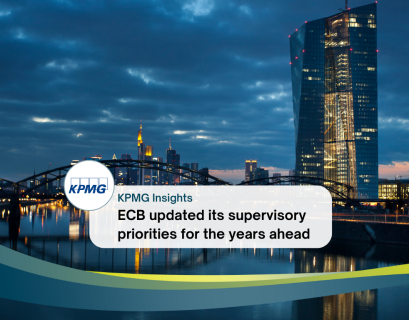Publication 1: Operational Resilience
The COVID-19 crisis has been an unexpected test of banks’ operational resilience, but other major disruptions are likely to occur in the future. It is essential for banks to strengthen their operational resilience and business continuity planning to weather this storm and prepare for possible future shocks. As the ECB itself notes, its priorities have increasingly turned to areas relating to the resilience and sustainability of banks.
In the first publication of the SSM beyond COVID-19 series, KPMG takes a look at how regulators and supervisors are responding – and how they are bringing their focus on operational resilience up to that of financial resilience.
Please find the full report on operational resilience here.
Publication 2: Credit Risk
Managing the effects of the crisis on credit risks and capital levels has been the top priority for banks. Strong credit risk management is crucial to avoid the risk of a cliff edge and procyclicality. As we look longingly towards a future beyond COVID-19, it is worth reflecting on some lessons learned. This publication is the second instalment in the SSM beyond COVID-19 series.
This report looks into COVID-19 implications for the credit risk environment and how banks are responding to the challenges through such a period of stress. As the ECB itself notes, “inaction today will cost us tomorrow”. Looking ahead, further steps are expected to be taken from the industry in order to cope with the COVID-19 impact on credit risk.
Please find the full report on credit risk here.
Publication 3: ICLAAP
As Europe moves through the cycle of downturn and recovery, capital and liquidity positions will have major implications for individual banks, systemic resilience, and the health of the whole economy.
The Internal Capital Adequacy Assessment Process (ICAAP) and Internal Liquidity Adequacy Assessment Process (ILAAP) – or together, simply ICLAAP are key tools for managing banks’ capital and liquidity. Banks should not see ICLAAPs as a supervisory test, or a compliance headache. Instead, banks should view them as a valuable planning mechanism, as a basis for sound decision-making, and as a vital tool for building trust and understanding with investors, supervisors, and other stakeholders.
This report aims to help banks critically reflect on the observed value of their ICLAAP over the recent months – their “ICLAAP performance”. It identifies two important lessons learned from the COVID-19 pandemic, and closes with some key fields of action to improve banks’ ICLAAP approach in the post COVID-19 world.
Please find the full report here.
Publication 4: Climate Risk
The COVID-19 pandemic has driven an increased focus on the importance of long-term stability, accelerating the ESG agenda, and triggering improvements in the way ESG risk is governed and managed. There is unprecedented momentum to embed ESG into banking and to ensure that the whole financial sector plays a key role in driving the transition to a sustainable economy.
This report looks at banks’ response to ESG risks and the key medium to long-term challenges that lie ahead. We focus on the implementation of ECB’s supervisory expectations on climate-related and environmental risks, with reference to the integration of ESG into banks’ strategies and frameworks, and the upcoming 2022 ECB climate risk stress test.
Please find the full report here.
Image: Alexander Jungmann/Pixabay





